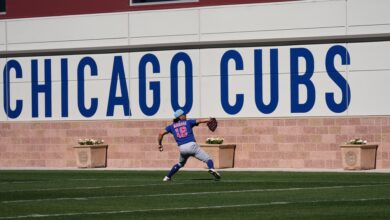
Chili Davis Effect Backfired, Cubs Hitters Regressed Across the Board
Chili Davis was hired by the Cubs to promote situational hitting awareness and “finish the development of [their] hitters,” as Theo Epstein put it. One person closely connected to the team told me after the hire that Davis was a “mental giant.” The Cubs’ intention was clear: Score more runs and be more consistent by improving plate approach, especially with runners in scoring position.
But the “Chili Davis Effect” was a systemic failure. As a unit, the Cubs failed to swing at better pitches, lift the ball, and knock in runs with runners in scoring position. The offense was a complete and total disaster as the Cubs lost the division lead and Wild Card game, prompting a shell-shocked Epstein to remark during his end-of-season press conference that they “broke somewhere along the lines.”
When Davis’s hiring was announced, I imagined it would lead to Cubs hitters swinging at better pitches in 2018. Nope, wrong, they actually swung at more pitches outside the strike zone. Heck, they even swung at more overall pitches.
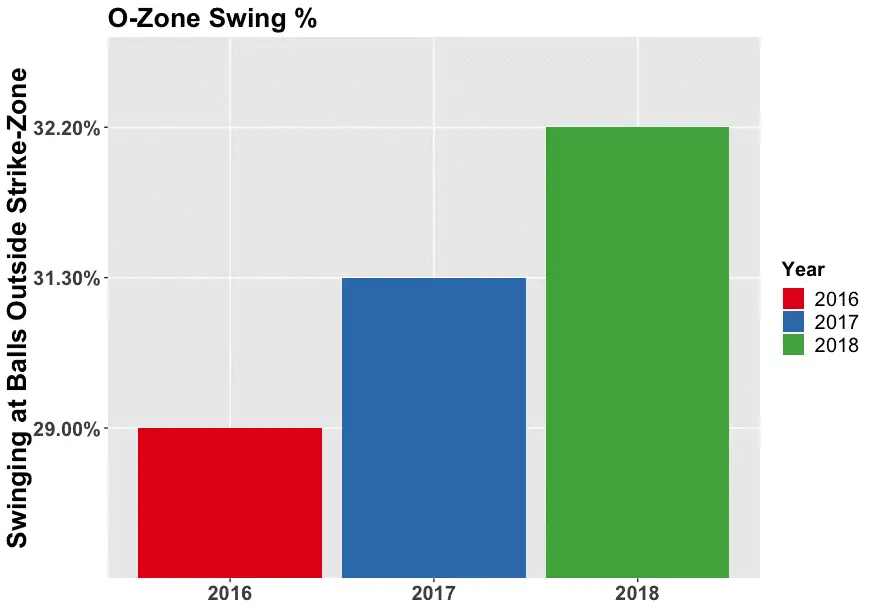

I also thought the Cubs would improve their contact rate because more contact is part of Davis’s MO. Nope again, the Cubs actually whiffed more under the tutelage of their new hitting instructor.

What’s worse than swinging at more bad pitches and whiffing more? When the Cubs did make contact, a higher percentage of the results were grounders.

And it’s more than just coincidence because you can totally tell the Cubs attempted to change their approach. We heard “go opposite field” over and over again throughout the season, which is exactly what the Cubs did. Epstein even noted that they led the league in opposite-field hits.
But as good as it is in theory to take what pitchers give you, the Cubs sacrificed overall contact, plate discipline, and batted balls to do so this past season.
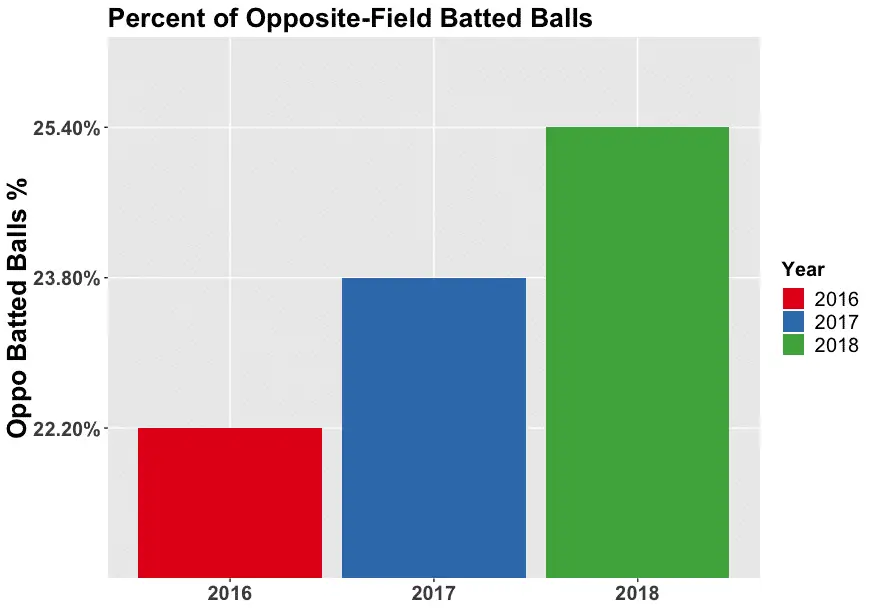
Above all else, though, Davis was brought in to improve situational awareness. So how did Cubs batters do with runners in scoring position?
Perhaps the most startling failure of all is the Cubs’ inability to produce any semblance of value with runners in scoring position (RISP). Just look at the team’s wOBA with RISP, which dipped well below league average and represented a steep falloff from their 2016 and 2017 seasons.
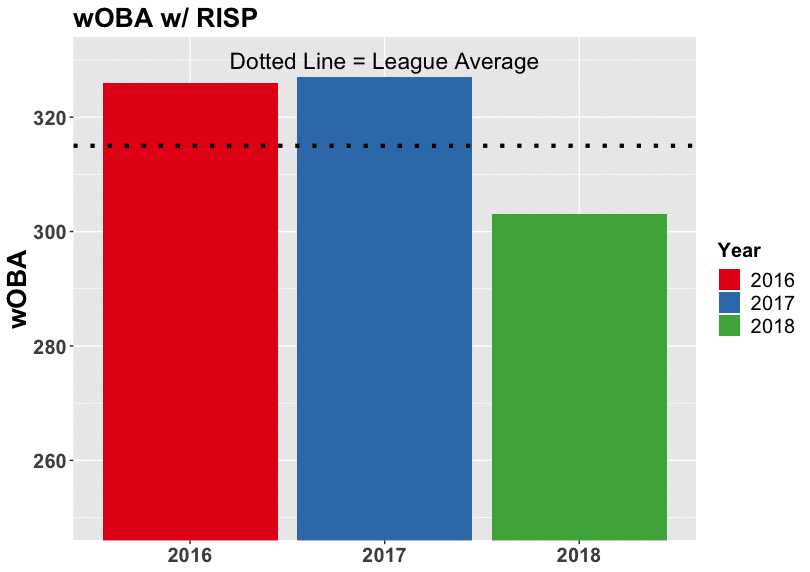
Maybe Cubs batters weren’t able to produce more runs because they were so intent on putting more balls in play. Perhaps the result of that philosophical change were that they hit more grounders with softer contact.


Even more troubling, Cubs batters also struck out more frequently with RISP than they had in either of the past two seasons. I expected the opposite effect.
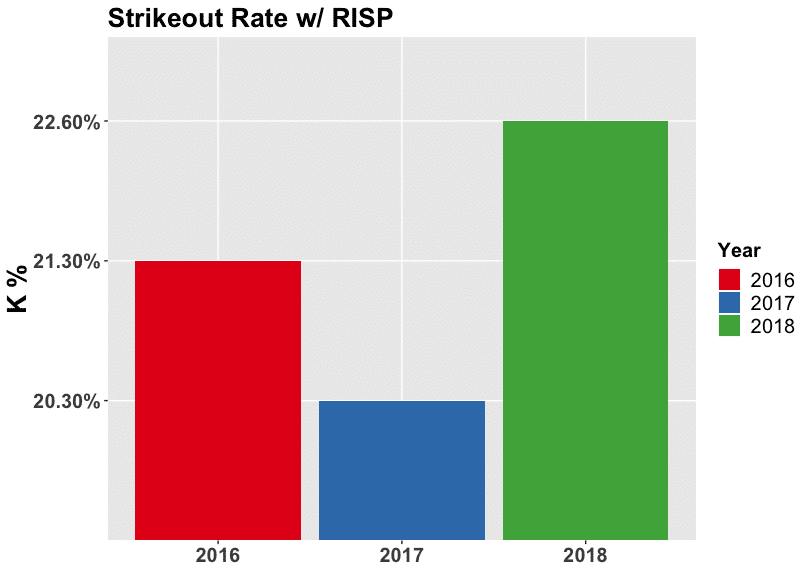
Final Thoughts
I was floored after hearing Epstein describe the Cubs offense as broken during his season-ending press conference. Epstein even said the 2018 offense necessitates a top-to-bottom system re-evaluation that would require all their energy this winter.
To be clear, this post isn’t meant to be a total condemnation of Chili Davis. I think the Cubs’ intention was fair, as they wanted their new hitting instructor to stress plate approach and situational awareness after the more mechanically-inclined John Mallee was let go. The Cubs front office consciously rolled the dice trying to further the development of their young hitters. It backfired. Not even in our wildest nightmares did we think the Cubs could go from a .182 ISO in 2017 to a bottom-third .152 ISO in 2018. In their attempts to adjust, power was sacrificed.
Maybe these young players can’t all change their core traits of slugging and whiffing, at least not in short order. And that might just be okay. Not everyone can be Kris Bryant and drastically improve contact while still mashing.
I have no idea what the solution is, although I’m tempted to say it’s as simple as permitting young hitters to be themselves. My perspective is limited, though. I’m not in the clubhouse or the film room, so I can only speculate on what went wrong. But when Epstein says the offense broke and when the data points to failed plate-approach adjustments, I expect big changes to be implemented for 2019.

